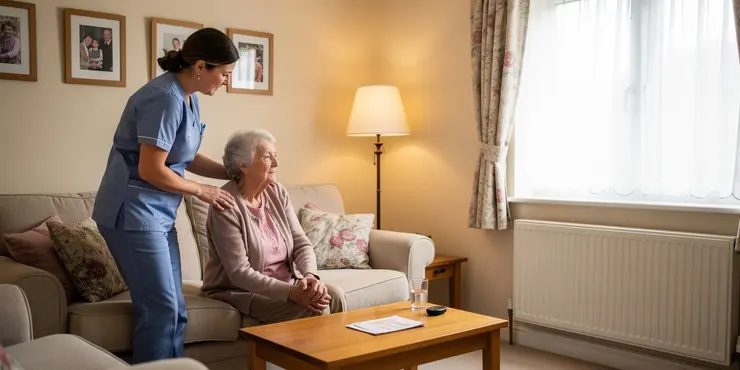
Find Help
More Items From Ergsy search
-

Are there any support groups for people with dementia in the UK?
Relevance: 100%
-
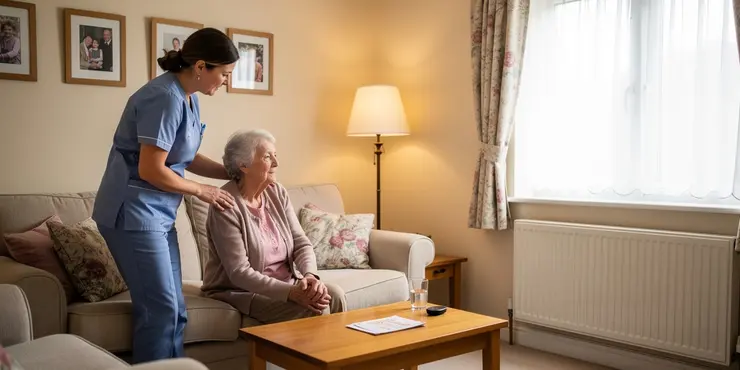
What financial support is available for people with dementia?
Relevance: 96%
-

Can live-in care support individuals with dementia?
Relevance: 87%
-
Living with dementia | NHS
Relevance: 83%
-

What is dementia?
Relevance: 77%
-

Is there a cure for dementia?
Relevance: 77%
-

Early onset dementia | NHS
Relevance: 77%
-
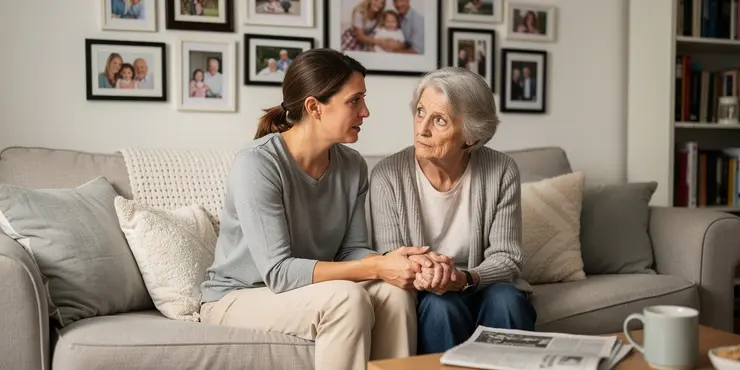
Can dementia affect younger people?
Relevance: 73%
-
What financial support is available for people with dementia?
Relevance: 70%
-
What financial support is available for people with dementia?
Relevance: 70%
-

Dementia Care at Colten Care
Relevance: 70%
-
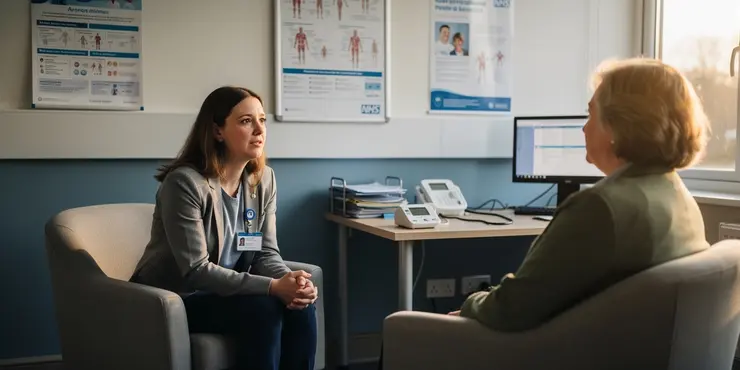
How does dementia progress over time?
Relevance: 70%
-

How is dementia diagnosed?
Relevance: 69%
-
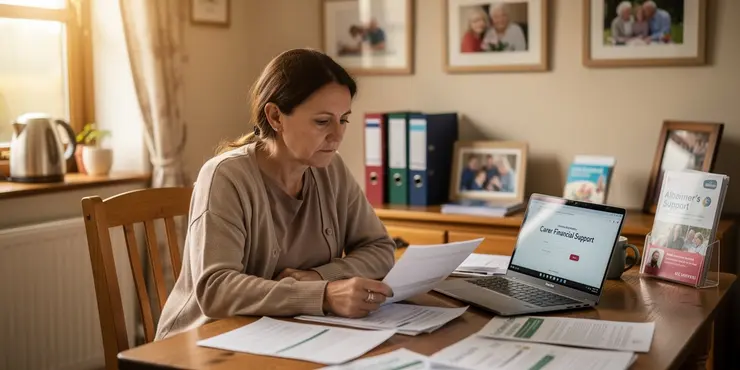
Are there financial support programs for carers of Alzheimer's patients?
Relevance: 68%
-

The role of care homes dedicated to caring for people living with dementia and memory loss
Relevance: 67%
-

What are the links between menopause and dementia?
Relevance: 66%
-
Are there specific types of dementia linked to menopause?
Relevance: 65%
-
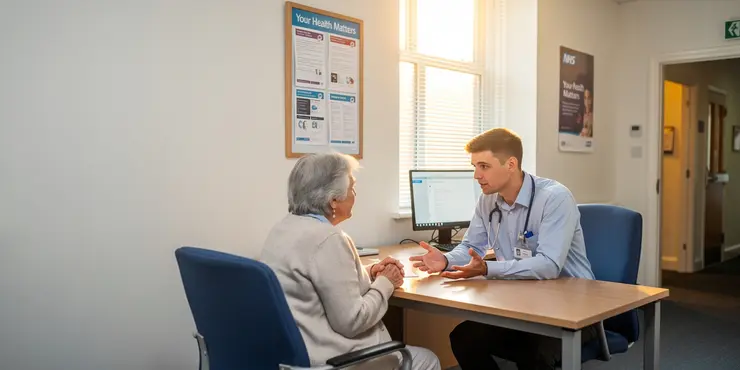
Dementia by Dr Alex Kakoullis, Coventry and Warwickshire Partnership NHS Trust
Relevance: 65%
-
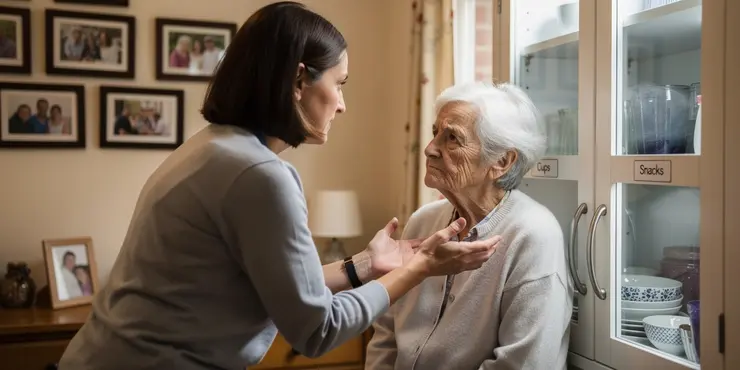
How can I support a loved one with dementia?
Relevance: 65%
-

Getting help and support with frontotemporal dementia (FTD) (part 2/3)
Relevance: 65%
-
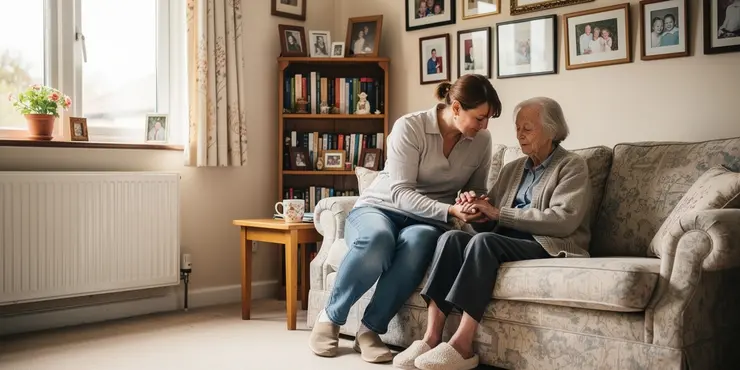
What role do carers play for those living with dementia?
Relevance: 65%
-

What financial support is available for funeral expenses?
Relevance: 64%
-

Is there scientific evidence linking menopause to dementia?
Relevance: 63%
-

Financial Support for Families Amid Rising Cost of Living
Relevance: 62%
-
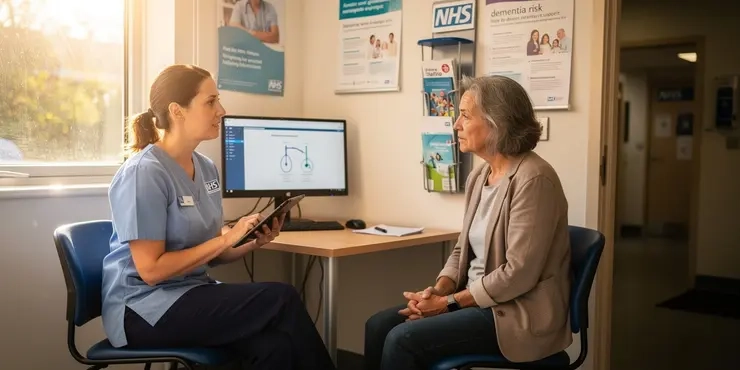
Do genetics play a role in dementia risk post-menopause?
Relevance: 61%
-

Is the age of menopause onset related to dementia risk?
Relevance: 60%
-

Do male and female brains age differently regarding dementia risk?
Relevance: 60%
-

How common is it for women to develop dementia after menopause?
Relevance: 59%
-
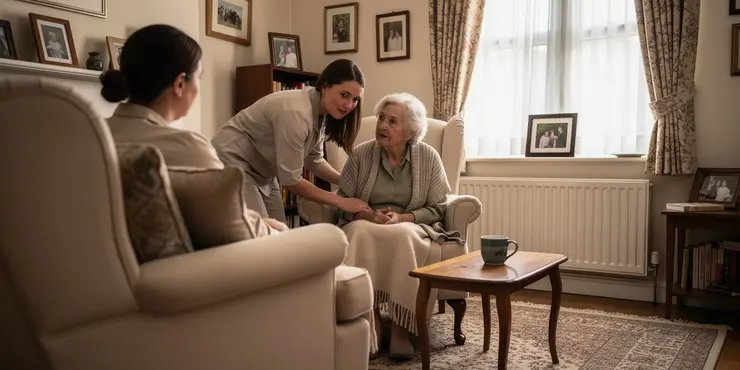
Living with changes in behaviour in frontotemporal dementia (FTD) (part 3/3)
Relevance: 58%
-

Can lifestyle changes during menopause help reduce dementia risk?
Relevance: 58%
-

How does menopause potentially affect dementia risk?
Relevance: 58%
-

What further research is needed about menopause and dementia?
Relevance: 58%
-

What support is available for carers of Alzheimer's patients?
Relevance: 58%
-

Can hormone replacement therapy (HRT) impact dementia risk?
Relevance: 57%
-

An introduction to frontotemporal dementia (FTD) (part 1/3)
Relevance: 57%
-
What symptoms can overlap between menopause and the early stages of dementia?
Relevance: 55%
-

What is dementia?
Relevance: 55%
-

Fernhill Dedicated Dementia Care Home - a relatives perspective
Relevance: 55%
-

Can a finance broker be liable for mis-selling car finance?
Relevance: 49%
-
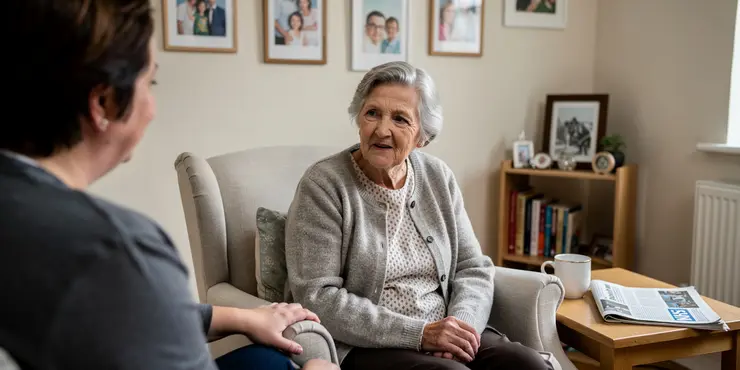
What are the common symptoms of dementia?
Relevance: 49%
Introduction
Dementia can bring significant financial challenges for both individuals diagnosed and their families. Understanding the financial support available for people with dementia in the UK is crucial to help manage costs related to care and daily living. This article outlines the principal financial resources and benefits available for those affected by dementia.
Attendance Allowance
Attendance Allowance is a non-means-tested benefit for people over the State Pension age who have a physical or mental disability, such as dementia, and require help with personal care or supervision. It is paid at two rates depending on the level of care needed: a lower rate for people who need frequent help or constant supervision during the day, and a higher rate for those who need help at all times.
Personal Independence Payment (PIP)
Personal Independence Payment (PIP) is intended for individuals under State Pension age who have a long-term health condition or disability that affects their ability to perform daily activities or mobility. PIP is gradually replacing Disability Living Allowance (DLA) for people aged 16 to 64. It evaluates how the condition impacts an individual's life rather than the condition itself.
Carer's Allowance
Carer's Allowance is available for those who spend at least 35 hours a week caring for someone with substantial caring needs. The person being cared for must receive a qualifying benefit, such as Attendance Allowance or the daily living component of PIP. Carer's Allowance provides essential financial support to those who dedicate a significant part of their lives to look after a loved one with dementia.
Local Authority Support
Local Authorities in the UK offer various types of support depending on the needs of the individual with dementia. Following a care assessment, they may provide services such as home adaptations, respite care, or free community equipment to help maintain independence. Financial assistance may also be available, subject to a means test.
Council Tax Discount
Individuals with severe mental impairments, including advanced dementia, may be eligible for a council tax discount or exemption. This discount may apply if they live alone or with others who are also exempt. An application must be made to the local council to access this support effectively.
Conclusion
Navigating the financial landscape for someone with dementia can be complex, but understanding the available support can ease some of the burden. It's essential for individuals and carers to explore all possible resources, including federal benefits and local authorities, to ensure the best possible support and care for those living with dementia in the UK.
Introduction
Dementia can cost a lot of money for people and their families. It is important to know what money help you can get for people with dementia in the UK. This guide explains the main types of money support available to help with care and living costs.
Attendance Allowance
Attendance Allowance is money for people over the State Pension age. It is for those who have a disability like dementia and need help with personal care. There are two amounts you can get, depending on how much care you need: a lower amount if you need help during the day, and a higher amount if you need help all the time.
Personal Independence Payment (PIP)
Personal Independence Payment (PIP) is for people under the State Pension age with a long-term health problem or disability. It helps with daily activities and moving around. PIP is replacing Disability Living Allowance (DLA) for people aged 16 to 64. It checks how your life is affected, not just the illness itself.
Carer's Allowance
Carer's Allowance is for people who spend at least 35 hours a week looking after someone with a lot of care needs. The person you care for must get a certain type of benefit, like Attendance Allowance or the daily living part of PIP. This money helps those who spend a lot of their time caring for someone with dementia.
Local Authority Support
Local authorities in the UK offer different types of help depending on the needs of the person with dementia. After a care check, they might give services like changes to your home, short breaks for carers, or free community tools to help people stay independent. You may also get money help, which depends on your financial situation.
Council Tax Discount
People with severe mental difficulties, like advanced dementia, may get a reduction or no council tax. This can apply if they live alone or with others who are also exempt. To get this help, you need to apply to your local council.
Conclusion
Finding financial help for someone with dementia can be tricky, but knowing what support is out there can make things easier. It's important for people and carers to look into all the benefits available, including from the government and local councils, to get the best care and support for those with dementia in the UK.
Frequently Asked Questions
Useful Links
This website offers general information and is not a substitute for professional advice.
Always seek guidance from qualified professionals.
If you have any medical concerns or need urgent help, contact a healthcare professional or emergency services immediately.
Some of this content was generated with AI assistance. We’ve done our best to keep it accurate, helpful, and human-friendly.
- Ergsy carfully checks the information in the videos we provide here.
- Videos shown by Youtube after a video has completed, have NOT been reviewed by ERGSY.
- To view, click the arrow in centre of video.
- Most of the videos you find here will have subtitles and/or closed captions available.
- You may need to turn these on, and choose your preferred language.
- Go to the video you'd like to watch.
- If closed captions (CC) are available, settings will be visible on the bottom right of the video player.
- To turn on Captions, click settings .
- To turn off Captions, click settings again.
More Items From Ergsy search
-

Are there any support groups for people with dementia in the UK?
Relevance: 100%
-

What financial support is available for people with dementia?
Relevance: 96%
-

Can live-in care support individuals with dementia?
Relevance: 87%
-
Living with dementia | NHS
Relevance: 83%
-

What is dementia?
Relevance: 77%
-

Is there a cure for dementia?
Relevance: 77%
-

Early onset dementia | NHS
Relevance: 77%
-

Can dementia affect younger people?
Relevance: 73%
-
What financial support is available for people with dementia?
Relevance: 70%
-
What financial support is available for people with dementia?
Relevance: 70%
-

Dementia Care at Colten Care
Relevance: 70%
-

How does dementia progress over time?
Relevance: 70%
-

How is dementia diagnosed?
Relevance: 69%
-

Are there financial support programs for carers of Alzheimer's patients?
Relevance: 68%
-

The role of care homes dedicated to caring for people living with dementia and memory loss
Relevance: 67%
-

What are the links between menopause and dementia?
Relevance: 66%
-
Are there specific types of dementia linked to menopause?
Relevance: 65%
-

Dementia by Dr Alex Kakoullis, Coventry and Warwickshire Partnership NHS Trust
Relevance: 65%
-

How can I support a loved one with dementia?
Relevance: 65%
-

Getting help and support with frontotemporal dementia (FTD) (part 2/3)
Relevance: 65%
-

What role do carers play for those living with dementia?
Relevance: 65%
-

What financial support is available for funeral expenses?
Relevance: 64%
-

Is there scientific evidence linking menopause to dementia?
Relevance: 63%
-

Financial Support for Families Amid Rising Cost of Living
Relevance: 62%
-

Do genetics play a role in dementia risk post-menopause?
Relevance: 61%
-

Is the age of menopause onset related to dementia risk?
Relevance: 60%
-

Do male and female brains age differently regarding dementia risk?
Relevance: 60%
-

How common is it for women to develop dementia after menopause?
Relevance: 59%
-

Living with changes in behaviour in frontotemporal dementia (FTD) (part 3/3)
Relevance: 58%
-

Can lifestyle changes during menopause help reduce dementia risk?
Relevance: 58%
-

How does menopause potentially affect dementia risk?
Relevance: 58%
-

What further research is needed about menopause and dementia?
Relevance: 58%
-

What support is available for carers of Alzheimer's patients?
Relevance: 58%
-

Can hormone replacement therapy (HRT) impact dementia risk?
Relevance: 57%
-

An introduction to frontotemporal dementia (FTD) (part 1/3)
Relevance: 57%
-
What symptoms can overlap between menopause and the early stages of dementia?
Relevance: 55%
-

What is dementia?
Relevance: 55%
-

Fernhill Dedicated Dementia Care Home - a relatives perspective
Relevance: 55%
-

Can a finance broker be liable for mis-selling car finance?
Relevance: 49%
-

What are the common symptoms of dementia?
Relevance: 49%


